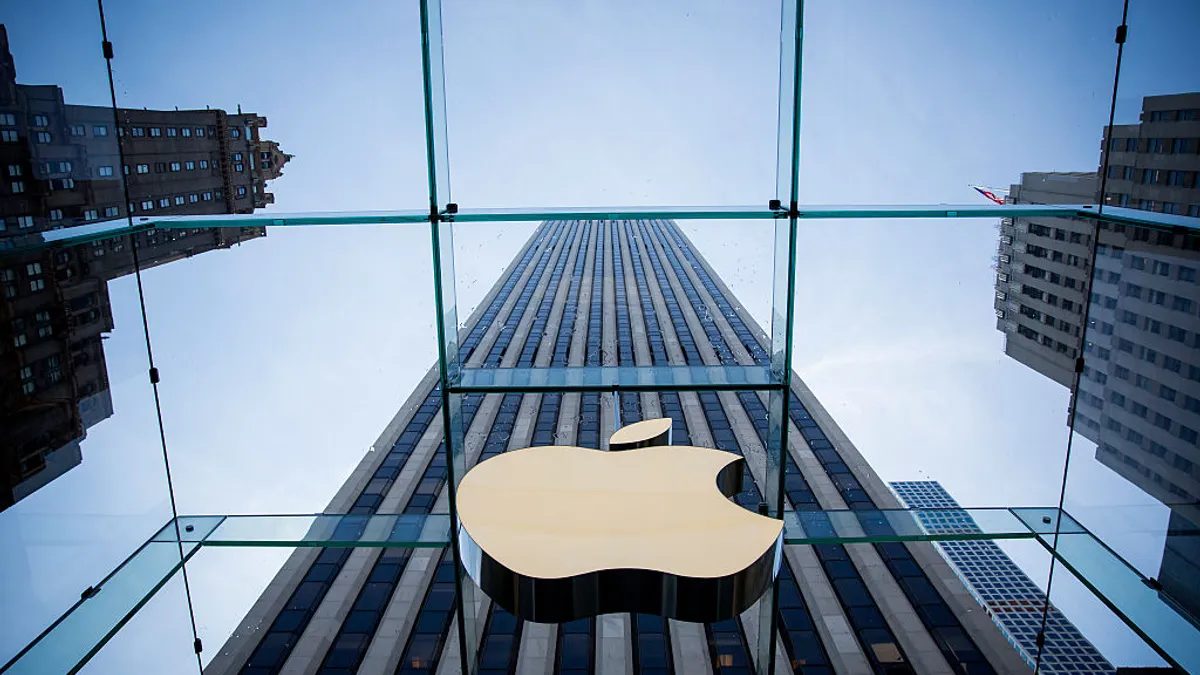Dive Brief:
- Apple has endorsed a California Senate bill that would require large companies to publicly disclose their carbon footprint every year, according to a letter of support sent to state Sen. Scott Wiener on Sept. 7.
- Senate Bill 253 would require business entities operating in California with annual revenues exceeding $1 billion to report the “emissions of greenhouse gasses, criteria pollutants, and toxic air contaminants” associated with their operations annually.
- Support from the popular consumer electronics manufacturer comes at a time when federal regulators are pushing for more transparency from companies on their climate-related investments and are cracking down on greenwashing practices.
Dive Insight:
Apple said “fighting climate change remains one of [its] most urgent priorities,” according to the letter shared by Wiener, one of the key lawmakers backing the climate bill, on X, formerly known as Twitter.
“We're strongly supportive of climate disclosures to improve transparency and drive progress in the fight against climate change, and we're grateful for your leadership to drive comprehensive emissions disclosure,” wrote Apple’s director of state and local government affairs, Michael Foulkes.
According to SB 253, California would pass regulations by 2025 that would require companies making more than $1 billion in revenue to publicly disclose their scope 1 and 2 emissions to a reporting organization in 2026 and, eventually, their scope 3 emissions starting 2027. The bill also requires companies to report their greenhouse gas emissions in a “manner that is easily understandable and accessible to residents of the state,” and requires such public disclosures to be independently verified by a third-party auditor. The bill would impact an estimate of over 5,300 companies operating in California.
Despite receiving support from major corporations such as Microsoft, Ikea U.S.A. and Patagonia, the bill has been opposed by the California Chamber of Commerce and Sempra Energy, the parent company behind Southern California Gas Co. and San Diego Gas & Electric.
Foulkes also advocated for companies reporting their scope 3 emissions as part of their carbon emission disclosures, though he acknowledged it would be difficult to collect such data and require “making educated assumptions and complex modeling.”
“While these emissions can be challenging to measure, they are essential to understanding the full range of a company’s climate impacts,” he said.
Scope 3 comprises emissions that are not directly produced by the company itself or assets owned or controlled by the company, but by those entities that are part of its value or supply chain, according to the Environmental Protection Agency. However, scope 3 emissions often represent the majority of an organization’s total greenhouse gas emissions.
Apple’s support for the climate bill comes as federal regulators deliberate on enhancing and standardizing climate-related reporting requirements.
In an effort to achieve consistency, the Securities and Exchange Commission released a proposal in March 2022 mandating that companies describe on Form 10-K their levels of greenhouse gas emissions and strategy toward reducing climate risk, a move that was met with much criticism from some Republican lawmakers, industry organizations and dozens of state attorneys general.
The agency has twice postponed a final rule as it seeks to evaluate a record number of public comments. Though the SEC has previously indicated its plans to release the climate risk disclosure rule next month, senior agency chairs have declined to set a formal completion date.
In a nod to the impending regulation from the SEC to standardize climate risk disclosures, Foulkes said Apple would “welcome further efforts to promote convergence at a national and international level.”
“Given the likely proliferation of mandatory disclosures at the international, national, and sub-national level, we appreciate the provisions for the state board to minimize the need for reporting entities to prepare duplicative reports or engage multiple assurance providers,” Foulkes said.
Keeping in line with its climate forward methodology, Apple announced the launch of its first set of carbon neutral products — a new lineup of Apple Watches with reduced product emissions — on Wednesday.










